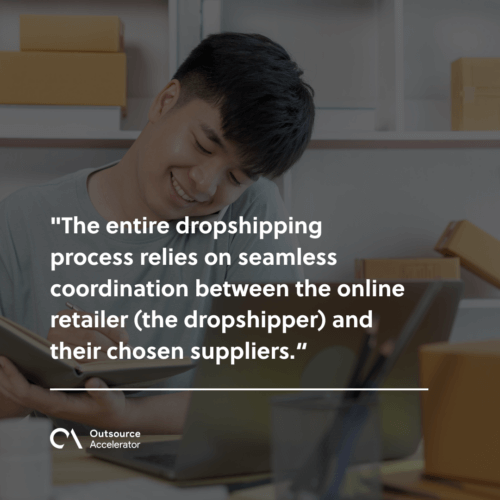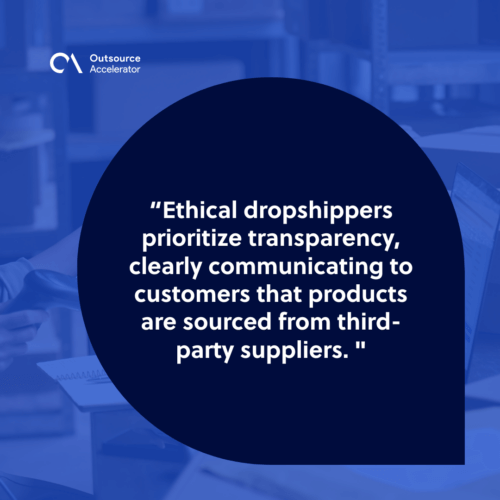Is dropshipping ethical? An in-depth exploration

Dropshipping has gained significant popularity as a convenient business model in e-commerce. It offers entrepreneurs the prospect of launching an online store without the burden of inventory management or logistics.
However, an important question demands scrutiny amidst this allure – Is dropshipping ethical?
The concept may seem innocent, but there’s been no shortage of controversy surrounding it. It’s crucial to consider the implications and ethical considerations surrounding dropshipping as a business practice.
This article attempts to unravel the ethical aspects of dropshipping, its pros and cons, and whether entrepreneurs should pursue it.
What is dropshipping?
Dropshipping is an e-commerce business model in which a retailer doesn’t keep any inventory of the products it sells. This literally means that there are no physical products in stock, and the seller never handles or even sees them.
Instead, when a customer places an order, the retailer purchases the goods from a third party and has them shipped directly to the customer.
The entire dropshipping process relies on seamless coordination between the online retailer (the dropshipper) and its chosen suppliers.
While this practice offers flexibility, critics have asked time and time again, “Is dropshipping ethical?”
This business model frequently raises questions about product quality control, shipping times, and the overall morality of a retail approach that distances itself from its products.

Pros of dropshipping
Dropshipping has several benefits that make it an appealing business model:
- Low initial investment – Dropshipping requires no upfront capital investment in inventory.
- Lower risk – Since you don’t need to buy inventory in bulk, you can test different products and markets without the risk of ending up with unsold goods.
- Easy scalability – Dropshipping enables you to scale successful products more quickly.
- Wide product selection – With dropshipping, the number and variety of products you can offer are unlimited, allowing you to adapt to market trends and customer preferences.
- Location independence – Dropshipping is an online business model that allows entrepreneurs to operate from virtually anywhere.
- Reduced operational hassles – As a drop shipper, you don’t need to worry about operational aspects like inventory management, packing, and shipping.
Cons of dropshipping
Despite its appeal, dropshipping also presents several disadvantages and potential challenges you should consider:
- Thin profit margins – Since you’re not purchasing in bulk, the unit cost per item tends to be higher compared to wholesale prices, which can result in lower profit margins.
- Intense competition – The low barrier to entry in dropshipping leads to a crowded market. The need to be competitive can cause price wars that impact overall profitability.
- Quality control challenges – The dropshipper doesn’t physically handle the products, ensuring quality control is challenging. Product issues and shipping delays can lead to customer dissatisfaction.
- Dependence on suppliers – The relationship with your suppliers is crucial for your business, and any problems on their end can disrupt your business operations.
- Customer service challenges – It can be complex to resolve customer issues when you don’t handle the inventory.
- Branding limitations – Dropshipping makes it harder to build a distinct brand identity as you are not in control of the product packaging and branding.
Is dropshipping ethical?
In the world of e-commerce, dropshipping ethics are a complicated and often contested subject. The question “Is dropshipping ethical?” has no definitive response due to people’s varying perspectives on it.
Some argue that it’s unethical to deceive and take advantage of customers essentially. Others believe that dropshipping is ethical, saying that it’s not fundamentally different from traditional retail.
Ethical concerns primarily arise in the following three areas:
Transparency and communication
One ethical consideration is the transparency of the supply chain.
Customers may be unaware that a product is dropshipped. Furthermore, the lack of communication regarding the sourcing and fulfillment process can be perceived as deceptive.
Ethical dropshippers prioritize transparency, clearly communicating to customers that products are sourced from third-party suppliers.

Quality control
Ensuring quality control can be difficult in dropshipping, as the seller doesn’t physically handle the inventory. This lack of control raises concerns about defective or misrepresented products reaching customers.
Ethical dropshippers take steps to vet and maintain relationships with reputable suppliers. They understand that customer satisfaction and product integrity must remain a priority.
Fair business practices
Some unethical dropshippers may engage in unprofessional practices such as:
- False advertising
- Delayed shipping times
- Misrepresentation of product features
Ethical dropshipping involves conducting business honesty, providing accurate product information, and delivering on timelines. Building consumer trust is essential to long-term success.
It’s worth noting that the ethical concerns in dropshipping can arise from specific practices rather than the business model itself.
In essence, whether dropshipping is considered ethical or not depends on how it is conducted.
Entrepreneurs who prioritize transparency, quality, and fair business practices contribute to a positive perception, while those who don’t risk damaging dropshipping’s reputation.
As with any business model, ethical considerations should guide decision-making to ensure a sustainable and responsible approach to e-commerce.
Is dropshipping legal?
To put you at ease, yes, we can definitively state that dropshipping is a legal business model. Still, to maintain an ethical dropshipping business, you must be aware of certain legal risks and considerations.
Here are some factors you must consider to keep dropshipping legal:
- Contractual agreements – These outline the terms of the business relationship, including pricing, payment terms, and shipping agreements.
- Compliance with laws and regulations – These laws govern e-commerce, consumer protection, and business practices.
- Intellectual property – Dropshippers must ensure that the products they sell do not infringe on intellectual property rights such as trademarks or copyrights.
- Business licensing – Dropshippers, like any other business, may need to obtain the necessary licenses and permits to operate legally in their jurisdiction.
Resorting to ethical dropshipping practices
Ethical dropshipping practices are crucial for the long-term success and reputation of your business. Following ethical guidelines lets you contribute to the overall integrity of the dropshipping industry.
Remember these key principles:
- Be transparent with customers about sourcing and pricing
- Ensure that you offer high-quality products
- Respect customer privacy
- Maintain fair pricing
- Collaborate with reputable suppliers
- Stay updated and compliant with legal obligations and regulations
An ethical approach to dropshipping isn’t just about following the law but treating your customer base and business partners with respect and fairness, providing excellent customer service all the way.
By embracing moral practices, your ethical dropshipping business can provide top-notch customer satisfaction and grow honorably.







 Independent
Independent




